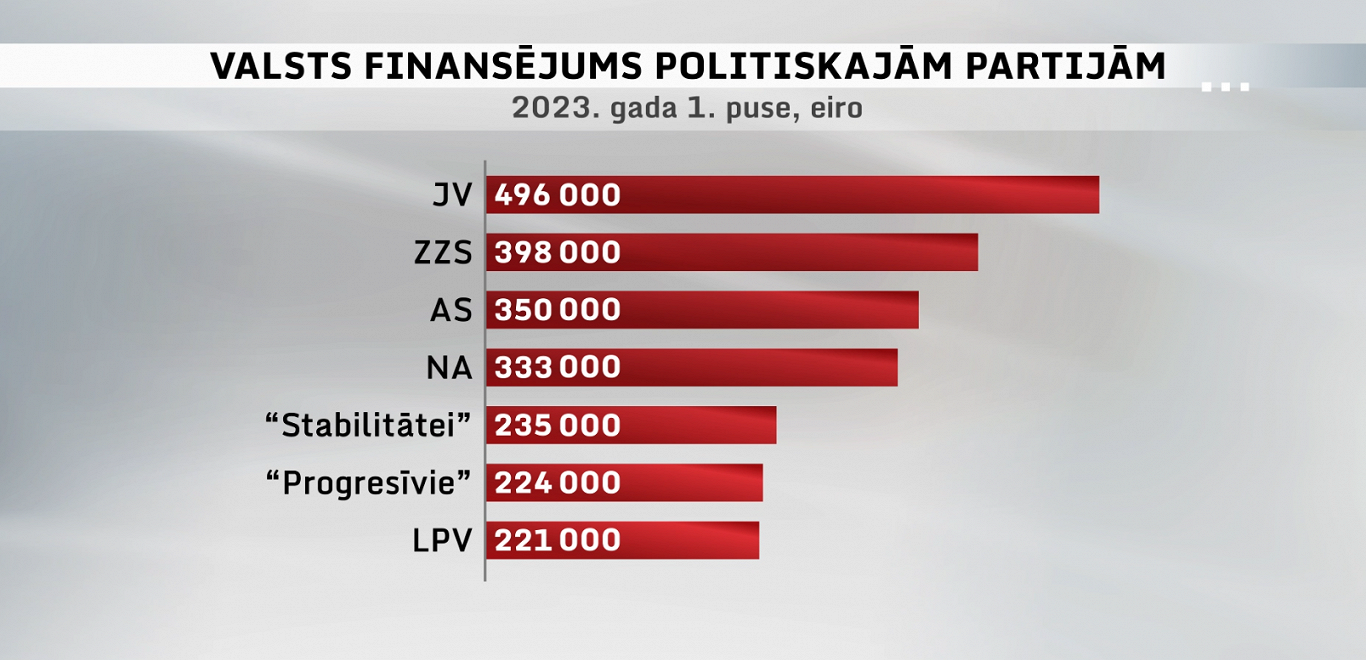However, political parties, which have been receiving much more generous funding from the public purse than in previous years, appear to be shunning the use of expert researchers when planning these important reforms, reported Latvian Television August 5.
Political parties will receive almost six million euros from taxpayers this year, and every subsequent year until the next elections. The amounts they receive are based on the previous election results, so the biggest beneficiary is New Unity (Jauna Vienotība), which receives almost half a million euros twice a year.
It is followed by the largest opposition party, the Greens and Farmers Union (ZZS), with almost 400,000 euros per half year; 350,000 euros goes to the United List (AS), 333,000 euros to the National Alliance, while approximately 220,000 to 230,000 euros goes to For Stability!, the Progressives and Latvia First (LPV).
When the Saeima decided to significantly increase state funding for political parties, the main argument was the need to reduce the parties' dependence on sponsors, and so free them from the influence of special interest groups. At the same time it was promised to invest these funds in strengthening the quality of the parties' offerings to the electorate, including by commissioning independent research, on which further political decisions could then be based.
But when surveying the parties, it turns out that little substantive research appears to have been done and mostly politicians do not turn to researchers for advice, but to the public, via sociological and opinion surveys.
In the first half of the year, New Unity commissioned research into its level of popularity, sometimes clarifying people's opinions, for example, about the Istanbul Convention or support for Ukraine. In total, about 17% of the half-year funding was spent on content including conferences and seminars, and 5% on the aforementioned research.

"Of course, it is also important to understand the opinion of people, residents, in that sense sociology is important, but I admit that parties, including New Unity, have historically had a problem with the development of their internal research resources," said party board member Vilnis Ķirsis.
"And in New Unity we are on the way to doing that. The party itself must have the ability to develop policies and put them on the table for officials to implement," Ķirsis added.
Even less, 12% of the half-year funding, was spent on the party's substantive activities by the National Alliance, which held seminars for young people and party council meetings in the regions, but did not research anything.
"It is possible that it could be done, that some questions could be asked, but of course it should be understood that there are political parties with a specific ideology, and of course that these studies could take place within the framework of this ideology," argued the National Alliance's Riga councillor Edvards Ratnieks.
He also foresees that cooperation with researchers and universities could take place, albeit within the framework of the party's existing ideology.
The United List also spent around 12% on content, for which studies and surveys were conducted, but details of whiat they were about are scant.
The biggest study – on the development of the national economy – is still ahead, and the United List hopes to apply the results in tax reform, about which discussions are already underway.
"It's not just sociology on topics, it's the attraction of competences, additional experts regarding the preparation of various political initiatives, draft laws, draft government regulations, and before that a full-fledged analysis," explained Edgars Tavars, head of the United List faction.
The largest opposition party, ZZS, has spent approximately 10% of the 400,000 euros paid out in the first half of the year on content, and in addition to various congresses, conferences and seminars, two polls have also been ordered.
ZZS board chairman Armands Krauze admitted that "you can look at what is being said on social networks, but it is not an indicator, because sometimes it is relevant only for a very small group of citizens and they start talking about it."
"It is very important for us to assess that this is really important for the majority of the population, and then we can advance specific proposals to the Saeima," Krauze said.
The Progressives spent a mere 8% on content, most of which went to the party congress, seminars and discussions, and only 2,000 euros on surveys.
Latvija First spent 2.5% of its funding on content and has not commissioned research.
For Stability! leader Aleksejs Roslikovs appeared not to take the issue seriously at all, replying to LTV's written questions only with a "heart".
"The funding that the state provides to the parties is large, it is objectively large," said political scientist Iveta Kažoka, saying that the parties either do not know how to use this money to strengthen their programs, or they do not see the point in it.
"The inertia is very strong from the time when the parties had a catastrophic lack of funds, from the time when all they could raise were funds for the pre-election campaign, and all the rest of the time they vegetated," said Kažoka. "Back then they vegetated without money, now unfortunately they vegetate with money and that's the problem, because it seems to me that for the millions that taxpayers allocate to political parties every year, we could expect better quality party work."




























